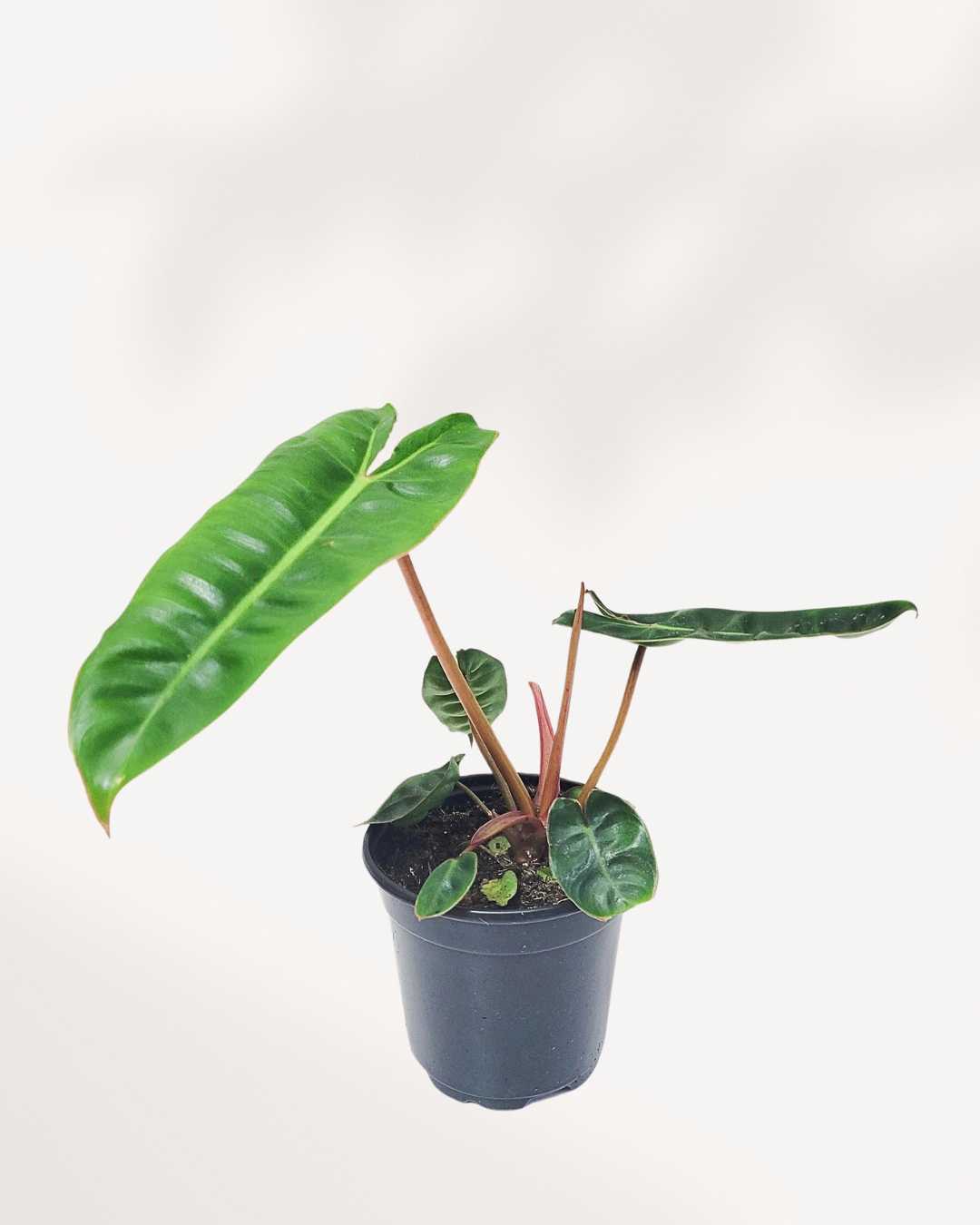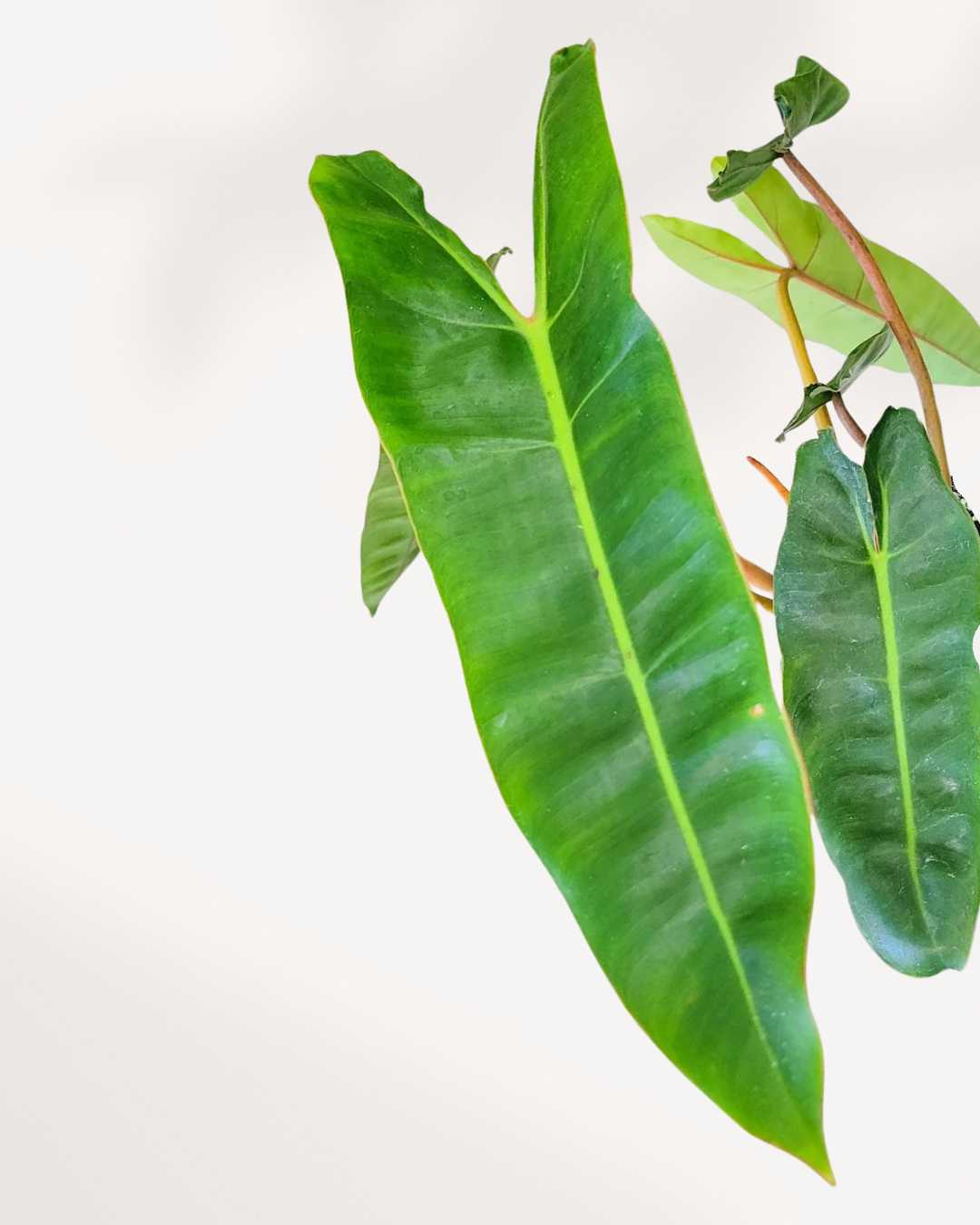Couldn't load pickup availability
Philodendron Billietiae is a striking tropical plant admired for its elongated, vibrant green leaves and eye-catching orange petioles. Its bold, architectural shape makes it a statement piece for indoor plant collections. Known for its relatively easy care requirements and air-purifying properties, this plant is a must-have for plant enthusiasts looking to add a touch of exotic elegance to their spaces.
Common Names
- Philodendron Billietiae
- Billietiae Philodendron
Botanical Classification
- Kingdom: Plantae
- Order: Alismatales
- Family: Araceae
- Genus: Philodendron
- Species: Philodendron billietiae
Native Habitat
Philodendron Billietiae is native to the tropical rainforests of Brazil, French Guiana, and Guyana. It thrives in humid, warm environments where it climbs trees and absorbs moisture and nutrients from the air, making it well-suited for indoor growth with proper care.
Historical and Cultural Significance
The Philodendron Billietiae is a collector's favorite, often admired for its elongated, dramatic leaves and unique coloration. Its striking look has made it a centerpiece in modern plant décor and a symbol of tropical luxury.
Uses and Popularity
This plant is highly valued for its decorative appeal, often serving as a focal point in homes and offices. Its air-purifying qualities and adaptability to indoor environments make it a practical and stylish choice for plant enthusiasts. With its tropical charm, it brings a lush, vibrant feel to any space.
Conservation Status
Philodendron Billietiae is not considered endangered but remains highly sought after by collectors and horticulturists, ensuring its continuous propagation in cultivation.
Description
Physical Characteristics
Philodendron Billietiae features long, lance-shaped leaves that can grow up to 3 feet (90 cm) in length. Its vibrant green foliage contrasts beautifully with its bright orange petioles, creating a tropical, exotic appearance.
Growth Habit
This plant exhibits a climbing or trailing growth habit, making it ideal for trellises, moss poles, or hanging baskets. It can reach impressive heights with proper support and care.
Popular Philodendron Varieties
Philodendron Brasil
- Known for its vibrant green and yellow variegated leaves, perfect for bright indoor spaces.
Philodendron Ring of Fire
- Bright red, yellow, and green variegation makes it a colorful statement plant.
Philodendron Pink Princess
- Famous for its dramatic pink and dark green leaves, adding luxury to your collection.
Philodendron White Wizard
- Features glossy green leaves with creamy white variegation, creating a striking visual contrast.
Philodendron Prince of Orange
- New leaves emerge in bright orange hues, adding warmth and color to indoor spaces.
Care Guide
Light Requirements
Philodendron Billietiae thrives in bright, indirect light but can tolerate lower light levels. Avoid direct sunlight, which may scorch its leaves. Learn More
Watering Needs
Water when the top inch of soil feels dry. Ensure the pot has drainage holes to prevent waterlogging. Avoid letting the soil dry out completely. Indoor Plant Watering
Soil Preferences
Use a well-draining potting mix enriched with perlite or orchid bark to improve drainage. Indoor Potting Mix
Humidity
Maintain moderate to high humidity levels to keep the foliage vibrant. Consider using a humidifier or misting the leaves regularly.
Fertilization
Feed with a balanced, water-soluble fertilizer every 4–6 weeks during the growing season. Reduce feeding during the winter months. Natural Fertilizer
Common Pests
Spider Mites
Spider mites can cause stippling and webbing on leaves. Regular misting and wiping can help prevent infestations. Learn More
Mealybugs
White, cotton-like clusters indicate mealybugs. Treat with rubbing alcohol or insecticidal soap. Learn More
FAQs
Can Philodendron Billietiae grow in low light?
Yes, it can tolerate low light, but brighter indirect light will help maintain its vibrant color.
Is it pet-friendly?
No, Philodendron Billietiae is toxic to pets if ingested. Keep it out of reach.
How often should I water it?
Water when the top inch of soil is dry. Avoid overwatering to prevent root rot.
Does it purify the air?
Yes, it is known for its air-purifying qualities, helping to remove indoor toxins.
How to take care of Philodendron Billietiae
Sun: Indirect
Sun: Indirect
Light: Bright
Light: Bright
Water: When half dry
Water: When half dry
Humidity: Medium
Humidity: Medium
Pet Friendly: Caution
Pet Friendly: Caution
Pro Tip
Pro Tip
Delivery Policy for Plant Condition
Delivery Policy for Plant Condition
"I have only received part of my order. What to do?
No worries if you've only got part of your order! Our plants come from different nurseries and might arrive in separate shipments, typically 1-2 days apart. It's all part of ensuring your green friends reach you in top-notch condition!
If you do not receive the remaining packages within 48 hours contact support at info@mygreenscape.ca
What is the Life Time Support?
Absolutely! Lifetime support means you can count on us whenever you have questions or uncertainties about your plant. Whether you're puzzled by its behavior or just want to ensure it's thriving, we're here for you. Connect with us on Instagram @mygreenscapeto or shoot us an email at support@mygreenscape.ca.
When it comes to our guarantee for plants shipped with standard or express, rest assured that we offer a 30-day happy healthy plant guarantee on all such shipments. This ensures that your plants are covered for 30 days after delivery, giving you peace of mind regarding their condition. If you have any concerns within this period, feel free to reach out to us for assistance.
For further details, please visit our Local Delivery, Store Pickup, Standard Shipping Guide Page.
What to expect
What to expect
Your plant will arrive in a standard nursery pot, typically 0.5" - 1" smaller than the stated size to seamlessly fit into your chosen decorative pot. Washable Paper Planter Bags are available for separate purchase.
Just like nature intended, each plant is unique, showcasing natural variations in size, shape, and characteristics. Our commitment is to deliver a plant that closely resembles the one featured on our website, matching your chosen size, and with the potential to thrive happily in your home.
Frequently Asked Questions
Frequently Asked Questions
Certainly! If you're pondering about ordering plants online, you're not alone. We've compiled the most frequently asked questions. Check out our FAQ section here for quick answers! Happy planting!
Plant & Pot Size Chart
Plant & Pot Size Chart
Choosing the right pot size for your plants can be a daunting task, especially if you're new to gardening. But fear not! Our pot sizes chart can help you find the perfect match for your plants, ensuring they have enough space to grow and thrive. With our guide, you'll be able to confidently choose the right pot size and plant variety for your gardening needs.
Plant Pot Size Guide.

| Extra Small | 7-10 cm | 2.5 - 3 inches |
| Small | 11-12 cm | 3.5 - 4 inches |
| Medium | 14-17 cm | 5 - 6 inches |
| Large | 19-21 cm | 8 - 10 inches |
| Extra Large | 24-27 cm | 12 - 14 inches |
All sizes are specified in product details.
Your Complete Guide to Pot Sizes: What Size Should You Choose?

When selecting a pot for your plant, it's important to find the right size. But with all the different options out there, how do you know which one is best? We're here to help!
MyGreenscape's pot sizes chart is a great resource for finding your perfect fit. Our easy-to-read chart takes out all the guesswork and helps you quickly choose the right size for your plant.
Smaller pots are best for seedlings or small plants just starting out. These tend to be shallow but wide, allowing enough room for the roots of the young plant but not too much where they get overcrowded. Medium-sized pots are ideal when your plant has grown from its infancy and is ready for more space. These are deeper and wider than small pots, so that it can accommodate larger root systems - making sure your plant gets enough nourishment while still giving it breathing room. Large pots are top choice if you have an established plant in need of lots of space - think trees and large shrubs! The spacious depth and width allow plenty of room for deep root systems without struggling for air or light.
No matter what size you choose, MyGreenscape has got you covered, with our pot sizes chart guaranteeing you find the perfect fit every time!
Winter Shipping Protection
Winter Shipping Protection
We take extra care with each package during the colder months. For destinations experiencing cold weather, we provide insulated packaging and heat packs as needed to protect your plants from freezing temperatures. With Winter Shipping Protection, your plants are equipped to arrive safe and sound, even in winter’s chill.
Care Guide
Care Guide
Explore essential care tips. check out our Comprehensive Resource for Indoor Plant Care.


WATERING MADE EASY
Check soil moisture before watering and use a potting mix that drains well. It’s the secret to healthy, happy plants!
Hear From Happy Plant Parents.
Who have brought Mygreenscape plants into their homes.





